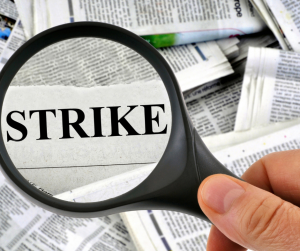Teachers shouldn’t be striking
When I first started teaching in 1986 the country was in the middle of continual strike action, but I was not in a militant union.
At the time, unemployment was high and I was glad and grateful to have a good job.
My sense of public service and caring for the children in my charge was something I put above striking for more pay.
In the end I couldn’t work even though I wanted to because so many in my school were on strike.
I remember being in a contentious conversation with another colleague who simply said ‘you have to strike’.
I told her I didn’t want to.
This kind of pressure was very uncomfortable and made me realise that a number in the profession had a political agenda. It wasn’t just about the money.
My opinion today is the same as it was then – I don’t think teachers should be striking.
Children have been seriously damaged educationally by the pandemic lockdowns, and strikes will cause further problems as they attempt to catch up on what they have lost.
I agree with the education secretary Gillian Keegan who said: “Our children don’t deserve it.”
The National Education Union’s members voted to strike with nine out of ten of those who voted doing so in favour of action.
However, two other teaching unions failed to get the response they wanted from members and won’t be striking.
This is a sign that there is no overwhelming will amongst teachers to walk out on their pupils.
Many, like me in the 1980s, want to stay in the classroom and teach.
However, the NAHT union said it might re-run the ballot because, ironically, some postal votes were held up due to striking Royal Mail workers.
The NEU has declared seven days of walkouts in February and March, with more than 23,000 schools in England and Wales expected to be affected. Scotland’s teachers are already striking.
Not only will it impact on pupils’ education, but the poorest will be hit hardest because parents will have to stay off work themselves to look after their children.
We all recognise that inflation in the economy is eroding public pay. But the priority must be to bring inflation down.
This does mean some level of pay restraint in the short-term.
If we look back to the mid-to-late 1970s inflation was very high and the Labour government tried to continually appease the unions.
Negotiations did occur but some of the pay awards that were made were huge and it just led to more inflation.
Eventually, the IMF was called in and when that happens there is no choice but wage restraint. The IMF dictates the terms and we don’t want to get anywhere near this situation again.
There is also an ‘agenda’ by more hard-left union leaders across various sectors to make as much political trouble for the government as possible.
Although they rightly care for their members, they are obviously seizing the moment to attempt to undermine the government which they perceive as weak.
It has been reported that unions are planning a ‘day of action’ – akin to a national strike – to pile more pressure on the government.
Partly this is politically motivated but also in reaction to the sensible ‘Strikes (minimum service level) Bill’ currently going through parliament.
This piece of legislation, which is similar to many laws in Canada and Europe, will force a minimum level of service during industrial action.
The real solution is to get the economy growing again and then we will be able to afford better pay for everybody, both in the public and private sector.
Large pay awards across the public sector and private sector will just make the problem worse and contribute to an inflationary spiral.
I believe this is a temporary problem and as the energy crisis eases and hopefully the war in Ukraine comes to an end things will be back on an even keel and the government will have more wiggle room.
However, this current scenario will have to play itself out.
Ends
